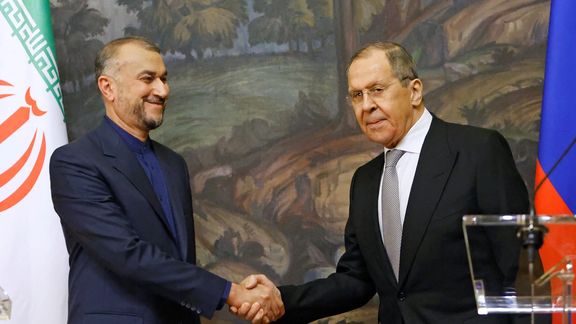Russia Joins China In Opposing Move Against Iran At UN Nuclear Board

Russia has joined China in opposing a possible resolution from the United States and ‘E3’ condemning Iran at next week’s meeting of the UN nuclear watchdog.

Russia has joined China in opposing a possible resolution from the United States and ‘E3’ condemning Iran at next week’s meeting of the UN nuclear watchdog.
Following a report from the United Nations’ International Atomic Energy Agency this week expressing dissatisfaction at Iran’s answers to queries over its pre-2003 nuclear work, the US and E3 – France, Germany, and the United Kingdom – have been discussing moving a resolution at the 35-member IAEA board meeting June 6-10.
Russian Foreign Minister Sergei Lavrov told Iranian Foreign Minister Hossein Amir-Abdollahian Friday that Moscow was in “definite opposition” to such a move The Iranian foreign minister told Lavrov that such a resolution would contradict the diplomatic process wherebyTehran and Washington exchanged notes over the past two months through Europeans.
Echoing a Chinese view expressed Thursday, Lavrov said that such a resolution would have “no positive impact” and that “issues of cooperation between IAEA and Iran should be resolved within IAEA’s technical path.”
Over the past year, the US and E3 have held back from moves critical of Iran’s co-operation with the IAEA so as not to undermined negotiations in Vienna over reviving the 2015 nuclear deal, the JCPOA (Joint Comprehensive Plan of Action), which the US left in 2018.
But questions over Iran’s pre-2003 nuclear work, and alleged lack of transparency over it, were recently revived by documents from 2004-5 released by Israel purporting to show Iranian efforts to hoodwink IAEA inspectors using information gleaned from purloined agency documents. This has blurred the distinction between the supposed ‘technical’ issues dealt with the agency and the ‘political’ process of JCPOA renewal.
‘Shrinking’
The administration of President Joe Biden, which came to office committed to re-joining the JCPOA as a means to gain cap Iran’s nuclear program, has insisted that not all US sanctions put in place by the previous administration of President Donald Trump contravene the 2015 agreement. Reports have suggested the 2019 listing of Iran’s Revolutionary Guards as a ‘foreign terrorist organization’ is a particular sticking point.
Joseph Borrell, the European Union foreign affairs chief, tweeted Saturday after a phone-call to Amir-Abdollahian that while the chance of reviving the JCPOA was “shrinking,” it could still be done “with an extra effort.” Borrell wrote he would “stand ready any time to facilitate a solution to the latest outstanding issues.”
US State Department Spokesman Ned Price said May 31 that the JCPOA revival was “absolutely within reach” and that the US would continue efforts to revive the deal as long as this held out clear non-proliferation benefits. But Iran’s accumulation of uranium enriched to 60 percent, the most serious violation of its JCPOA limits since 2019, has strengthened domestic criticism of Biden, both from JCPOA critics and from those arguing Biden needs urgently to revive the agreement.
Price Friday cited Secretary of State Antony Blinken speaking with Oman’s Foreign Minister Sayyid Badr al-Busaidi to thank him for efforts to mediate both over the current truce in Yemen and to discuss Iran.